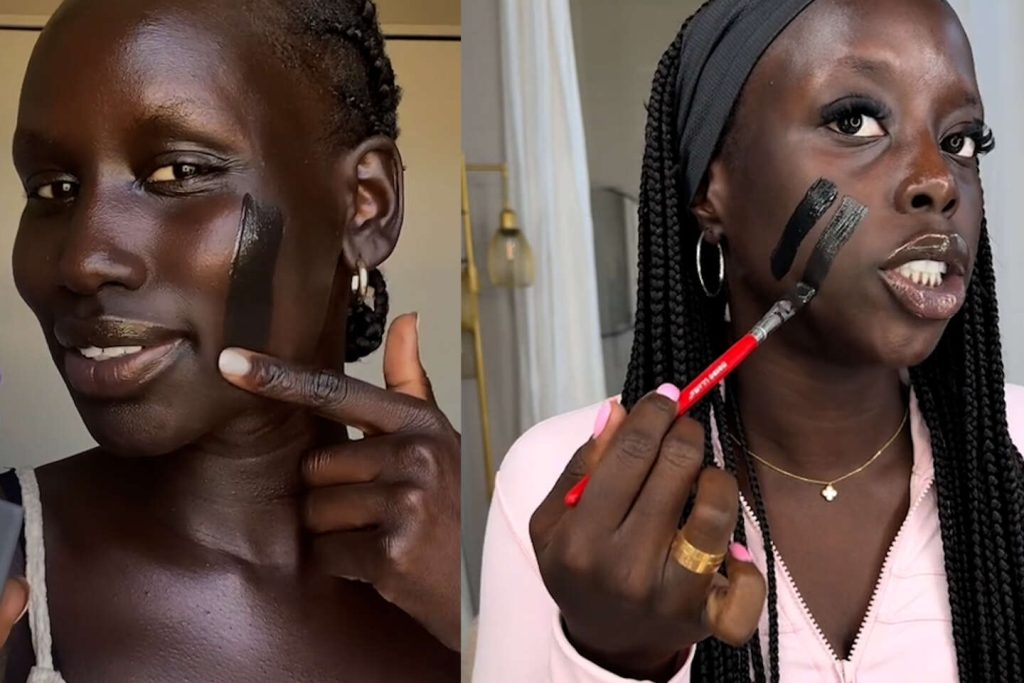In a video posted on TikTok in early May, beauty influencer Awuoi Matiop is seen applying foundation from the brand Youthforia, which had been released a few weeks earlier and was intended for “black” skin. However, the makeup is so dark that it drastically darkens her skin, even though she claims her complexion is already “one of the darkest on the planet.” In short, this foundation is not suitable for anyone and is seen as a “slap in the face” by the young woman. The video has been viewed tens of millions of times in just two days. Other internet users have also posted similar content, likening this foundation to “tar” or “black paint.” This controversy reignites accusations of racism that have been leveled at the cosmetics industry multiple times.
This incident has sparked a wider conversation about diversity and representation in the beauty industry, particularly for people of color. The lack of inclusivity in makeup products has been a long-standing issue, with many brands failing to offer a wide range of shades that cater to all skin tones. This leads to situations where individuals with darker skin tones struggle to find products that match their complexion, as seen in the case of Awuoi Matiop. The backlash against Youthforia’s foundation serves as a reminder of the importance of creating products that are truly inclusive and representative of the diverse population.
The controversy surrounding Youthforia’s foundation highlights the need for greater diversity not only in product offerings but also in decision-making processes within the beauty industry. It is crucial for brands to have diverse representation in their teams to ensure that products are developed with the needs of all consumers in mind. By including voices from different backgrounds and experiences, companies can avoid missteps like the one seen with the overly dark foundation. This incident underscores the importance of inclusivity at all stages of product development, from conceptualization to marketing.
The impact of social media on the beauty industry is also evident in this situation, as the video posted by Awuoi Matiop quickly went viral and sparked a widespread conversation online. Platforms like TikTok provide influencers with a powerful tool to amplify their voices and hold brands accountable for their actions. This incident demonstrates the power of social media in bringing attention to issues of diversity and representation and pushing for change within the industry. Consumers are increasingly using their platforms to demand inclusivity and challenge brands to do better.
Moving forward, it is essential for the beauty industry to listen to the feedback and concerns raised by consumers, especially from marginalized communities. Brands must take proactive steps to ensure that their products are inclusive and cater to a wide range of skin tones. This includes conducting thorough testing and research to develop shades that are suitable for all customers, as well as actively engaging with diverse communities to understand their needs and preferences. By prioritizing inclusivity and diversity, the beauty industry can create a more equitable and representative space for all consumers.
In conclusion, the controversy surrounding Youthforia’s foundation underscores the ongoing challenges of diversity and representation in the beauty industry. This incident serves as a reminder of the importance of creating inclusive products that cater to the needs of all consumers, regardless of their skin tone. By listening to feedback from consumers and taking proactive steps to diversify their offerings, brands can work towards building a more inclusive and equitable beauty industry. Social media has played a significant role in amplifying these conversations and holding brands accountable for their actions, highlighting the power of online platforms in driving positive change.


